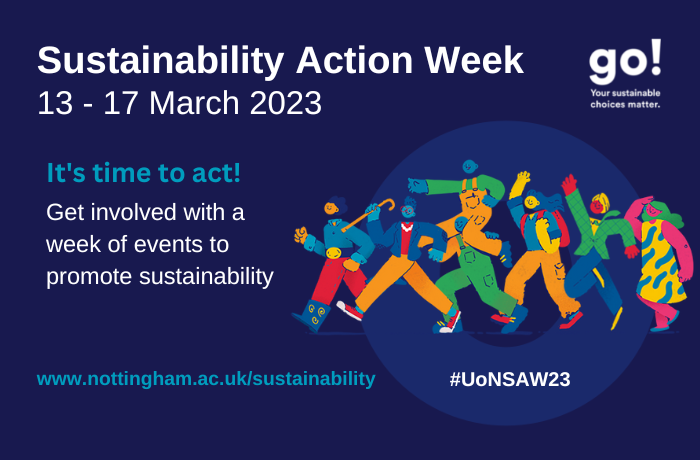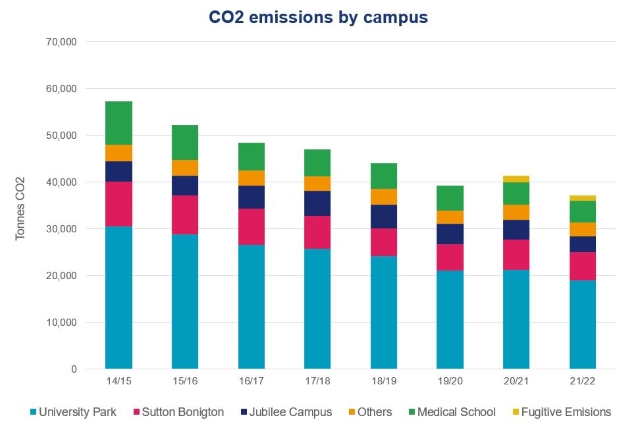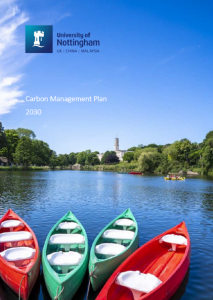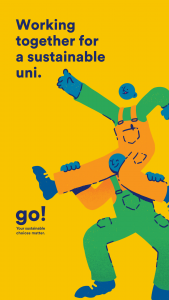
March 13, 2023, by sustainablenottingham
Going carbon neutral – with your help
By Professor Robert Mokaya, Chair of the Environmental Sustainability Committee.
As we begin our Sustainability Action Week 2023, it’s good to reflect on the actions and outcomes that have characterised our environmental sustainability journey over the past year. I am pleased that the university made great progress and had some significant achievements in 2022. Here, I will mention only some of them; both individual and university-wide projects were awarded Green Gown Awards, we were ranked third in the world for sustainability by the UI Green Metric, and we became a founding member of the UN Nature Positive University programme.

Prof. Robert Mokaya
I am aware many of you within the university community made contributions to improving our sustainability in your own ways. I applaud you and hope that your efforts will go even further and meet greater success in 2023.
One of the key measures of our environmental sustainability is the extent to which we are reducing our CO2 emissions. A focus on what we are doing to reduce our CO2 emissions seems right as we go through Sustainability Action Week.
The road to a sustainable future
The university has a specific Key Performance Indicator to reduce carbon emissions. We have had carbon reduction targets for decades and have made great progress in achieving these. We have built on this by adopting science-based carbon reduction targets. This approach calculates the level of carbon reduction needed to meet the Paris climate agreement and the UK Government’s aim of becoming carbon zero by 2050.
These targets enable the university to become net-zero by 2040 and absolute carbon zero by 2050. To get there, we need to reduce our carbon emissions by 63% by 2030 compared to 2018/2019 levels.

Scope 1 and 2 emissions from our UK campuses
Our Scope 1 and 2 carbon emissions are a product of our energy (gas, primarily, and electricity) consumption. The graph shows the progress we’ve made and also the impact of the pandemic. Emissions dipped in 2019/2020 as our campuses closed, yet still remained higher than we would have liked. We have therefore been working to ‘lock in the benefits of lockdown’ by removing waste and delivering efficiency gains, whilst ensuring our spaces are inviting and comfortable. Emissions then spiked in 2020/2021 as buildings had increased ventilation due to Covid.
Despite this, we are currently on track to meet our 2030 target, with CO2 emissions falling to 37,000 tonnes in 2021/2022, a 10.2% reduction compared to the previous year.
Whilst this is encouraging, there is a long way to go to stay within our overall carbon budget and the road will only get steeper and harder to travel. Achieving our carbon reduction targets will require a change in the behaviour of our community, and significant investment to move towards more sustainable energy provision and use.

Over the past year, heating costs have risen for everyone. Keeping our staff and students warm is a main priority. The university’s energy costs have increased from around £18m to £25m in this financial year. Given that the costs may be higher again next year, we need to be as sustainable and efficient as possible in our approach to energy.
We have several large-scale projects planned, including; solar schemes, LED lighting upgrades, lab equipment improvements (e.g. fume cupboards) as well as investment in district heating infrastructure. However, our biggest challenge revolves around decarbonising heat and moving away from natural gas. Therefore, our 2030 Carbon Management Plan focuses on the need to:
- reduce demand for heat, by improving the thermal efficiency of buildings,
- invest in efficient systems and controls that deliver heat into buildings,
- move from natural gas to technologies such as air and ground source heat.
As a university, we recognise how important it is that every investment we make (e.g. buying new property, new activities in teaching and research, etc) contributes positively towards our carbon objective. The purchase of the Castle Meadow Campus (CMC) is such an example of offering better value than a new build. However, the CMC will still require well-thought-out investment to reduce its CO2 emissions through building improvements, heating, cooling, lighting etc.
Your sustainable choices matter
We are in this together, and everyone has a part to play on this journey. All of the university community, staff and students, have a responsibility to act sustainably, reduce carbon emissions and help global efforts to minimise the effects of climate change. The best way to do this is to reduce the amount of resources we use e.g. by saving energy both on and off campus.

However, the bulk of our carbon emissions, 160,000 tonnes CO2, do not come from our energy consumption, but from everything else we do. These Scope 3 emissions are largely a direct consequence of consumption of materials. Reducing them means consuming less and making more sustainable choices with environmental, social and economic benefits which align with our values and goals. We have started to put in place actions that address six priority areas. It is in these key areas that the actions of our community will have the biggest impact on:
- business travel
- print/paper products
- catering
- construction
- IT
- laboratory equipment

Sign up to Green Rewards
At an individual level, we have made it easy for staff and students to take positive environmental action, both on and off campus, through Green Rewards. Indeed you can record your sustainable actions to earn points and win vouchers for yourself and charity donations for your team. Since launching in 2021, UoN users have saved more than 130,000 kg CO2 through their sustainable actions and raised £1,500 for charity. If every student and member of staff used Green Rewards, together we could save 423 tonnes of CO2!
If you work in a laboratory, you can take part in LEAF and complete actions to save water, energy, waste and other resources within labs, earning bronze, silver or gold accreditation. Many of our labs are already making some great improvements.
You can find out more about sustainability at the university and also ways to get involved as part of Sustainability Action Week running 13-17 March. There are events and talks happening all week to help as we work together for a sustainable university.
Robert Mokaya, Chair of the Environmental Sustainability Committee
![]()
No comments yet, fill out a comment to be the first

Leave a Reply